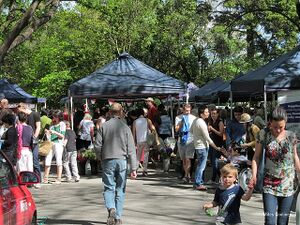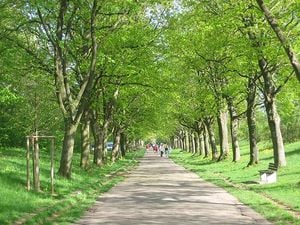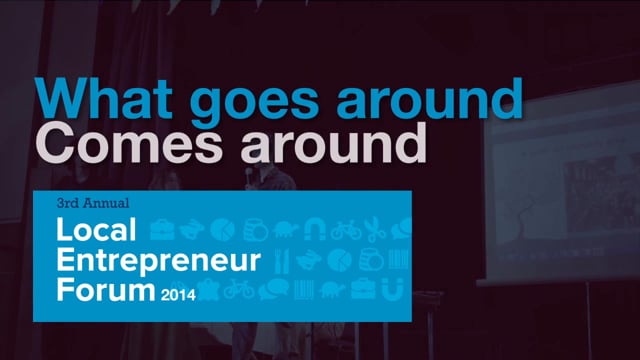
Localism as used here is about local needs met locally.
A vibrant, diverse local economy is a healthy and resilient economy. Meeting local needs locally can mean less pollution and CO2 emissions from unnecessary transport, as well as providing economic opportunities. Some have tried to argue that this approach is anti-trade, whilst its supporters contend it is just anti dependence on trade.
 Africa’s Great Green Wall will only combat desertification and poverty by harnessing local solutions, theconversation.com (Oct 08, 2024)
Africa’s Great Green Wall will only combat desertification and poverty by harnessing local solutions, theconversation.com (Oct 08, 2024)  Senegal’s remote Bassari people talk about climate change, and how their local knowledge is key to coping strategies, theconversation.com (Jun 11, 2024)
Senegal’s remote Bassari people talk about climate change, and how their local knowledge is key to coping strategies, theconversation.com (Jun 11, 2024)  The powerful municipalism operating in Naples and Barcelona has concrete lessons for community power in the UK, Daily Alternative (Mar 19, 2024)
The powerful municipalism operating in Naples and Barcelona has concrete lessons for community power in the UK, Daily Alternative (Mar 19, 2024)
Community action projects[edit | edit source]
- develop Community currencies
- develop Community energy schemes
- encourage local and collaborative enterprise
- encourage local purchasing, recycling and sharing via for example skill-sharing schemes and other community resources
- local directories and maps
- ownership surveys and websites promoting local and independent shops and suppliers
- promote local food, via
- local food challenges such as a 100 mile diet
- local food directories and maps
- local food weeks or other food events
- supporting local farm shops, farmers' markets and pick your own schemes, perhaps encouraging car sharing to these
- support local crafts, such as basketmaking, or crafted (non-plastic) shopping bags which can replace plastic bags
- support local markets, including farmers' markets and WI (Women's Institute) markets
- surveys of the local economy to find out what proportion of spend is local
Events[edit | edit source]
No events found.
 May 3 - 5, 2024 (Fri - Sun) — Jane's Walk, How to Lead a Jane's Walk, Video, janeswalk.org
May 3 - 5, 2024 (Fri - Sun) — Jane's Walk, How to Lead a Jane's Walk, Video, janeswalk.org May 6 - 12, 2024 (Mon - Sun) — Screen-Free Week, screenfree.org
May 6 - 12, 2024 (Mon - Sun) — Screen-Free Week, screenfree.org Jun 21 and all of June — World Localization Day, worldlocalizationday.org
Jun 21 and all of June — World Localization Day, worldlocalizationday.org
Bioregionalism[edit | edit source]
see separate article: Bioregionalism
Cosmolocalism[edit | edit source]

 We know that cosmolocalism is a way of empowering communities. But it's also the seeds of a new (and needed) economic system, The Daily Alternative (Jul 18, 2023)
We know that cosmolocalism is a way of empowering communities. But it's also the seeds of a new (and needed) economic system, The Daily Alternative (Jul 18, 2023)  Sheffield’s Opus Network is the very ideal of a CAN - making media, doing business and connecting to a planet of ideas, The Daily Alternative (Jul 13, 2023)
Sheffield’s Opus Network is the very ideal of a CAN - making media, doing business and connecting to a planet of ideas, The Daily Alternative (Jul 13, 2023)
Resources[edit | edit source]
Citizens data initiative[edit | edit source]
Studies show that people at farmers’ markets have as many as 10 times more conversations, greetings, and other social interactions than people in supermarkets.[1]
Quotes[edit | edit source]
"...the best hope for transition to a ‘post carbon’ — or, better, a sustainable society (a much broader goal) — lies in a process of radical societal reconstruction, focused on the building, in the here and now, of self-governing and self-reliant settlements, starting at the micro-local level. Jonathan Rutherford, summarising from Ted Trainer[2]
“Every increase in local capacity to grow food, generate energy, repair, build and finance will strengthen the capacity to withstand disturbances of all kinds. Distributed energy in the form of widely disbursed solar and wind technology, for example, buffers communities from supply interruptions, failure of the electrical grid, and price shocks. Similarly, a regionally based, solar-powered food system would restore small farms, preserve soil, create local employment, rebuilt stable economies, and provide better food while reducing carbon emissions and dependence on long-distance transport from distant suppliers. The primary goal in rethinking development and economic growth is to create resilience – capacity to withstand the disturbances that will become more frequent and severe in the decades ahead”. David Orr, ‘Down to the Wire’[3]
Research[edit | edit source]
Reclaiming Public Services, How cities and citizens are turning back privatisation tni.org, Jun 2017
Video[edit | edit source]
Other resources[edit | edit source]
- Economic Solutions, Change-Making
- "kickstart" actions and more from Radical Relocalization
- Will You and Your Community Survive Collapse?, Dave Pollard, December 24, 2010. Transition and Resilience: 65 Essential Abilities For a Relocalized World
- Short Circuit, Strengthening Local Economies for Security in an Unstable World: online edition of the book, by Richard Douthwaite. Includes updates (c.2002-2006) to individual sections.
See also[edit | edit source]
- Cosmolocalism
- Localism UK
- Arts and culture
- Communities online
- Community currencies, sustainable community action
- Community involvement
- Ethical consumerism
- Food activism, including Local food
- Food Sovereignty
- Free stuff
- Getting to know your locality, Getting to know your region
- Reduce, reuse, repair and recycle
- Resilient communities
- Sharing
- Community energy
- Towards sustainable economies
- Transition Towns
- Urban sustainability
- World 5.0
- Community land trust
local information and news can be found, or shared, via our many location pages
External links
- Wikipedia: Localism (politics), Localist activism, Local community, Local purchasing, Fiscal localism, Positive aspects of peak oil, Transition town, Community development corporation, Bioregionalism W
YIMBY (Yes In My Backyard) wiki
Creative commons
- REconomy, Helping you transform your local economy. Part of the Transition Network
Other
- Local Futures (formerly the International Society for Ecology and Culture) is a non-profit organization whose purpose is to raise awareness about what it identifies as the root causes of contemporary social, environmental and economic crises.
- The group argues that focusing on single issues – saving whales, blocking nuclear power plants, feeding the hungry, etc. – only overwhelms people and ultimately fails as a strategy. Instead, Local Futures believes that the focus must be on changing the fundamental forces that create or exacerbate all of these problems. Among those forces are economic globalization, corporate power, and conventional notions of technological and economic "progress". As a solution, Local Futures promotes economic localization and other locally based alternatives to the global consumer culture, as a means to protect both biological and cultural diversity. W
References




